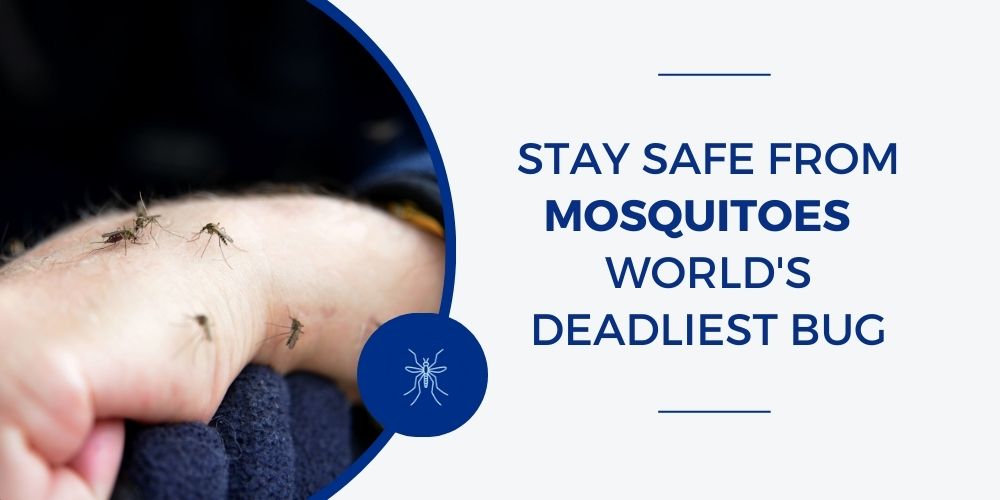There are few things more annoying than trying to enjoy a beautiful evening on the patio, only to be overtaken by mosquitoes and their itchy bites. Aside from being highly annoying, certain mosquitoes can also be dangerous. In fact, more deaths are caused by mosquitoes spreading diseases than any other creature in the world. In Arizona, they are most active between March and October, reaching peak activity during monsoon season.
Aside from leaving behind a trail of itchiness and pain, there are several diseases that they are known to spread. Mosquitoes typically contract these diseases from biting infected animals. Then, when an infected mosquito bites a human, the disease can be spread.
There are more than 200 species of mosquitoes found in the United States and 46 of them make their home in Arizona. The good news is the majority of mosquitoes are considered nuisance mosquitoes, which means they don’t spread germs that will make people sick, but their bites can still be irritating.
Arizona Spreaders
There are three types of mosquitoes people need to watch out for in Arizona; the culex, Aedes aegypti and anopheles freeborni mosquitoes.
Culex mosquitoes
- Carry West Nile virus and St. Louis encephalitis virus.
- Lay their eggs in standing water, mud puddles, bird baths, ponds, water dishes, drainage ditches, etc.
- They feed on birds and mammals, transmitting the virus from birds to humans.
- Most active during dawn and dusk.
Aedes aegypti mosquitoes
- Carry diseases such as chikungunya, dengue, yellow fever and Zika virus.
- None of these are present in Arizona but can be easily introduced by travelers.
- Females lay their eggs in tree holes, old tires, flowerpots, barrels, cans and other containers that hold a limited amount of water.
- Bites all day long.
Anopheles freeborni
- Also known as the malaria mosquito, spreads malaria and West Nile virus.
- The number one spreader of malaria in Arizona until its eradication in the early 1900s.
- Larvae prefer clear, fresh seepage water in sunlit or partially shaded areas.
- More likely to bite in the evening.
Because mosquitoes are small and quick, it is almost impossible to tell the species apart before getting bit. This is why it’s important to prevent mosquito bites altogether. Preventing mosquito bites is often the only way to prevent mosquito-spread diseases.
Diseases to Recognize
Even though cases are rare, it is important to be aware given the dangers of the various diseases mosquitoes bring. It is also challenging to initially diagnose with symptoms that range from fatigue and stomach issues to high-temperature fevers. Moreover, most cases are symptom-free, but extreme cases can result in permanent damage or even death.
Malaria
Malaria has been uncommon in the United States since its eradication in the early 1900s, but it is still important to note. Malaria can be spread to humans through anopheles mosquitoes. It often presents with flu-like symptoms such as fever, chills headache, muscle aches and tiredness. Nausea, vomiting and diarrhea are also potential symptoms. If not treated quickly, the infection can become severe and potentially deadly. If someone is experiencing symptoms of malaria, a healthcare provider can test for the disease. Fortunately, if identified, malaria is also treatable with prescription drugs. There are vaccines that prevent malaria, but they aren’t available in the United States.
West Nile Virus
West Nile virus is often spreads to humans after a mosquito bites an infected bird and goes on to bite a human. It’s also the most common mosquito-spread illness in Arizona with an average of 100 reported cases a year. Thankfully, only around 20 percent of people infected with the West Nile virus experience symptoms. If symptoms are present, they likely include high fever, headache, disorientation, body aches, vomiting, diarrhea and even vision loss. In extreme cases, or if left untreated for a long period of time, West Nile virus can result in death. People older than 50 or who have a pre-existing health condition are more likely to develop symptoms.
St. Louis Encephalitis Virus
Arizona experienced its first St. Louis encephalitis virus, or SLEV, outbreak in 2015. This virus is rarer than West Nile, but it also spreads through mosquitoes and birds such as crows, ravens and jays. After biting an infected bird, a mosquito can pass the virus onto humans it bites after approximately one week. Also, much like the West Nile virus, most people infected with SLEV don’t experience any symptoms. Those who do may experience a fever, headache, nausea, vomiting and tiredness. In extreme cases, encephalitis, meningitis, long-term disability or death can occur. There aren’t any vaccines or medications to treat SLEV, so it’s important to prevent getting bit in the first place.
Dengue Fever
Until October 2022, dengue fever wasn’t found in Arizona mosquitoes, only in mosquitoes outside the United States. Most dengue fever cases in Arizona are a result of travelers getting bit by infected mosquitos while traveling internationally and then returning home. Symptoms are similar to malaria, West Nile Virus and SLEV. The symptoms include fever, headaches, fatigue and vomiting. In the worst cases, dengue fever leads to long-term health risks such as increased bleeding, reduced consciousness or Dengue shock syndrome, which is often deadly. Much like SLEV, there are no vaccines or treatments, so the best prevention is to protect against mosquito bites.
Chikungunya
Chikungunya is spread primarily through the Aedes aegypti mosquito, which are common in Arizona. However, the ones in Arizona don’t appear to be infected with chikungunya so far. The only reported cases of chikungunya in Arizona were found in people who traveled outside of the United States when they were infected. It takes three days to a week before a person develops symptoms from a chikungunya-infected mosquito. Unlike the other diseases contracted from mosquitos, four out of five people with chikungunya will experience symptoms. Common symptoms are fever, severe joint pain, headache, muscle pain and rashes. Chikungunya rarely results in death, but the symptoms can be disabling. Recovery normally takes multiple weeks and there aren’t any vaccines or medications known to prevent or treat the disease.
Yellow Fever
Like chikungunya, yellow fever is primarily spread through the Aedes aegypti mosquito, but mosquitoes infected with the disease are not yet found in Arizona. All reported cases in Arizona are people who traveled internationally and returned infected. It takes a person three to six days after a bite to develop yellow fever symptoms. Those infected with yellow fever may experience headaches, back pain, body aches, nausea and vomiting. In some cases, people experience weakness and fatigue for months after contracting yellow fever. Severe cases will develop a high fever, yellowing skin and eyes, bleeding or shock and failure of organs. If not properly treated, extreme yellow fever can be deadly. Like many mosquito-spread diseases, there is no vaccine or specific treatment available for yellow fever.
Learning about these diseases may be scary, but it is important to remember that the odds of contracting one of these illnesses from a mosquito bite are low. Another piece of good news is that these diseases are easily preventable by avoiding mosquitos and their bites.
Most importantly, don’t let the fear of mosquitos keep you inside – Bug & Weed Mart can help! We have solutions that can prevent mosquitoes before they become a problem. Getting rid of mosquitos may seem impossible, but we carry traps, repellants and bacterium granules that are safe for humans and animals and are effective at controlling the mosquito population. In addition, be vigilant about removing any standing water around the home and yard to ensure that mosquitoes won’t breed nearby.
Bug & Weed Mart sells safe, professional-grade DIY pest control products to keep unwanted pests away. Visit one of our Valley-wide locations and talk to our experts to determine the best solution to protect against mosquitos in and around your home.

